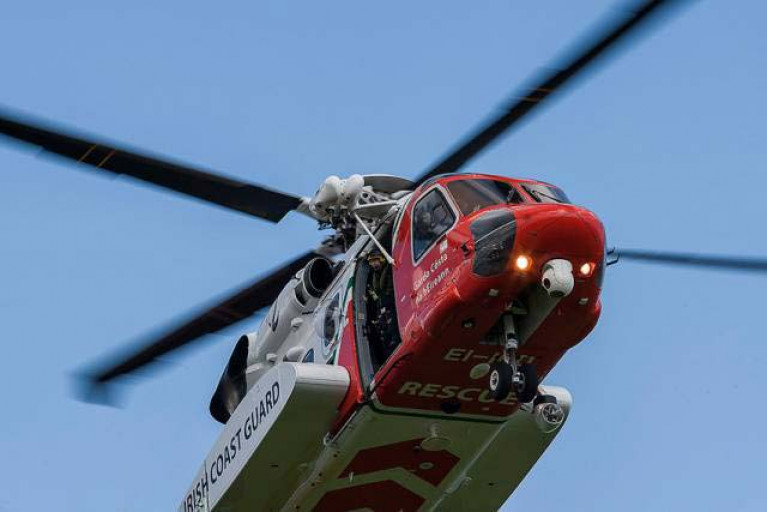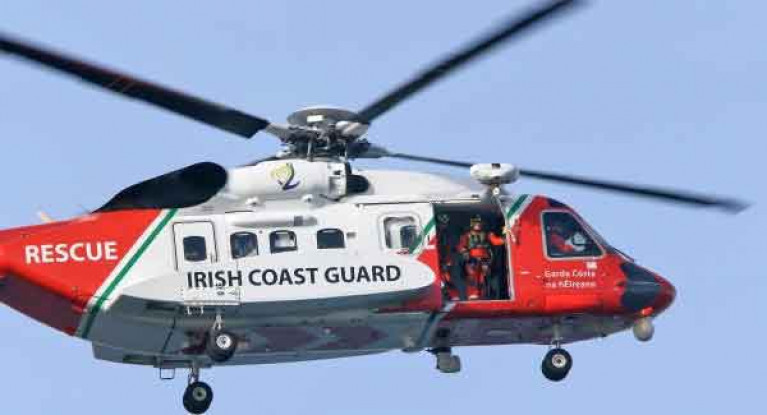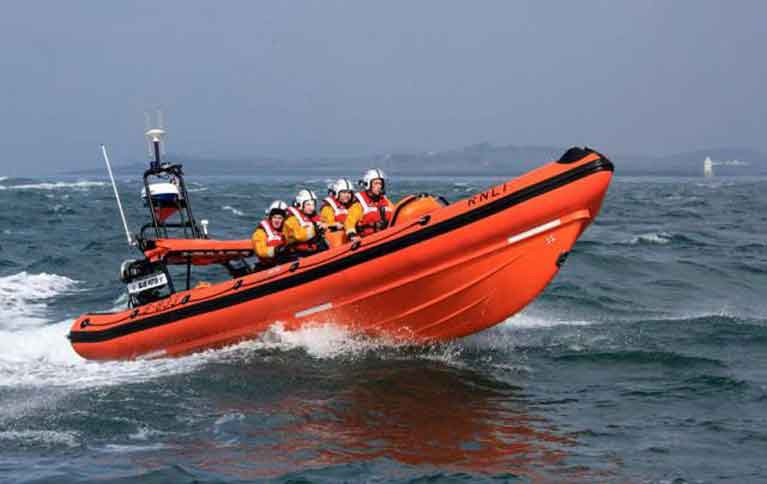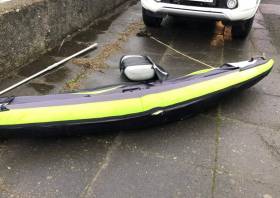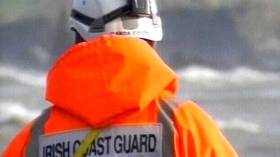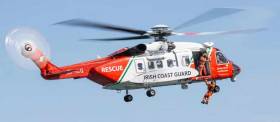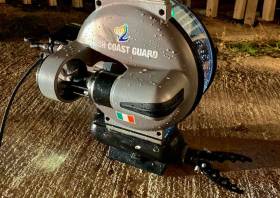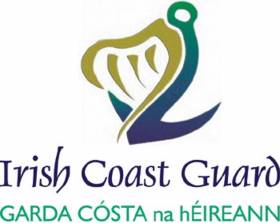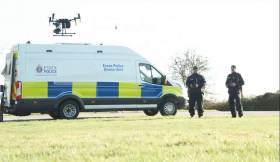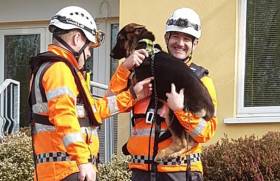Displaying items by tag: Coastguard
The Minister for Transport’s approval of a review of the Air Accident Investigation Unit’s draft final report into the Rescue 116 helicopter crash has been described as “unprecedented” by the Irish Airline Pilots’ Association (IALPA) writes Lorna Siggins.
The pilots’ union has expressed concern that the delay in publishing the final Rescue 116 report and an imminent general election may set back “urgent reform” of Irish aviation regulation.
CHC Ireland has declined to comment on whether it sought the review, which is permitted under the Air Navigation (Notification and Investigation of Accidents, Serious Incidents and Incidents) Regulations 2009.
It is the first time in the AAIU’s 25-year history that the review option has been sought before a final report is issued.
The helicopter company employed the four aircrew – pilots Dara Fitzpatrick, Mark Duffy, Paul Ormsby and Ciarán Smith – who died when their Sikorsky S-92A helicopter hit Blackrock island off north Mayo in the early hours of March 14th, 2017.
The bodies of Paul Ormsby and Ciarán Smith remain missing, in spite of extensive searches.
The Department of Transport said it could not confirm which “party” requested the review, as reported in The Sunday Times today here.
CHC said it “continues to engage fully with the investigation and remain committed to complying with our obligation to avoid commenting on any aspect of the final report”.
CHC Ireland is holder of the 500 million euro Irish Coast Guard search and rescue contract, which is due to expire in 2022 – though an extension could be allowed to 2025- and work has already begun on preparing a new tender.
The Department of Transport confirmed that arrangements are being made for the review of the draft final report, which was released to interested parties last autumn for comment within 60 days.
The AAIU does not seek to apportion liability or blame, but lack of oversight by the Irish Aviation Authority and management failures by the Irish Coast Guard and CHC have already emerged as factors.
The preliminary report published in April 2017 identified faulty navigation systems and incorrectly fitted satellite locator beacons on the lifejackets of the two pilots.
The Dublin-based crew had been tasked to provide “top cover” support to the Sligo-based Rescue 118 helicopter for a medical evacuation off the west coast.
Stakeholders were informed on January 8th of a delay in publishing the final report, when the AAIU confirmed that an “interested party” “had “served written notice of re-examination on the Minister for Transport...on specific findings and conclusions contained in the draft final report”.
Regulation 15 (1) of the Air Navigation Regulations 2009 allows for a re-examination of “any findings and conclusions in that report that appear to reflect adversely on the person’s reputation or on the reputation of any person, living or dead, whose executor, administrator or other representative he or she is”.
The report’s delayed publication, along with an anticipated general election, means legislation which would transfer air navigation functions from the IAA to a new Irish Air Navigation Authority is in danger of “sliding down the legislative agenda”, Ialpa president Capt Evan Cullen said this weekend (sat).
“This Bill includes vital reforms to aviation regulation which are essential to bring Ireland into line with European aviation safety norms,”Capt Cullen said, calling on the Government to make it a priority.
Capt Cullen noted that the Minister for Transport had committed as far back as August 2015 to restructure the regulatory functions of IAA, but progress had been “protracted”.
The IAA currently has a “conflict of interest” in holding a safety mandate for regulatory oversight while it also “makes money out of the same entities that it regulates”, he said.
“The aviation industry in Ireland should be a cause of pride. However, Ireland’s aviation regulator remains an outlier in terms of its corporate structure,” Capt Cullen said.
“ The framework of the IAA is so outdated it is undermining Ireland’s reputation for upholding safety standards. This needs to be urgently addressed,” he said.
“Once this bill is initiated, we urge the party whips in the Dáil and Seanad to commit to agreeing to prioritise the passage of the bill so as to facilitate its enactment in advance of the general election,” Capt Cullen said.
The chair of the review board for the AAIU’s final draft report must be a barrister or solicitor of no less than ten years’ standing or a person who, in the minister’s opinion, has “aeronautical or engineering knowledge or other special knowledge or experience of air navigation or aviation”.
The review will be held in private, with the applicant given 21 days’ notice. A report is then compiled for the minister if the re-examination proceeds.
For more, read The Sunday Times here
Accidental Activation of Satellite Beacons & Expired Equipment Causing False Alerts- Irish Coast Guard
Accidental activation of satellite beacons or expired equipment meant that the majority of almost 200 such alerts proved to be false alarms this past year, the Irish Coast Guard has said.
In its end of year statement, the Irish Coast Guard has emphasised that beacons should be handled and tested regularly, and expired equipment should be properly disposed of.
It says the COSPAS-SARSAT satellite beacon alerting system has a “huge role to play” in alerting search and rescue authorities of people in distress.
Mobile phones should not be relied upon as the only means of emergency communication at sea, it warns, due to limited and unreliable coverage at sea and susceptibility of such devices to water ingress.
The Irish Coast Guard’s three rescue co-ordination centres at Malin Head, Co Donegal, Valentia, Co Kerry and Dublin managed a total of 2,487 incidents over the past year – slightly down on the total of 2,647 for 2018 and 2,503 for 2017.
A total of 378 lives were saved – as in, assistance was provided that prevented, loss of life, severe risk to life, or protracted hospitalisation.
Irish Coast Guard units run by 940 volunteers were involved in 1075 call-outs ranging from shore rescue boat and cliff rescue to shoreline search services. Support was also provided to communities during periods of bad weather.
The four Irish Coast Guard search and rescue helicopters based at Dublin, Shannon, Waterford and Sligo flew lover 770 missions last year, including both offshore and coastal missions and inland searches for missing people in support of the Garda Siochána and mountain rescue teams
A total of 123 emergency missions from offshore islands to the mainland were flown, and helicopter emergency medical service support was provided to the national ambulance service. The busiest inter-hospital transfer route is from Letterkenny to University Hospital Galway, it says.
The Irish Coast Guard says that the RNLI was asked to launch lifeboats on over 815 occasions this past year.
Irish Coast Guard director Eugene Clonan highlighted publication of the two key documents - a national search and rescue plan, and an oil spill contingency plan - as two “significant achievements” in 2019.
“I want to acknowledge the very constructive engagement that we had with a multiplicity of stakeholders,” Mr Clonan said.
He also said he wished to acknowledge “the commitment and professionalism of our volunteer members”.
“In addition to the three core services that they provide, they are an integral part of community resilience and continually act as the eyes and ears of our rescue coordination centres in responding to any coastal emergency,” Mr Clonan said.
He said the Irish Coast Guard would continue to focus on the importance of prevention as a core safety theme in the coming year, working with Water Safety Ireland, the RNLI, Bord Iascaigh Mhara and the Irish Sailing Association.
Irish Coast Guard & RNLI Christmas & New Year Safety Message
The Irish Coast Guard and the RNLI have called on the public to pay particular attention to their personal safety when engaging in any water-based or coastal activities over the Christmas and New Year period. The two organisations have also issued a joint thank you to their nationwide search and rescue teams for their work during the past twelve months and paid tribute to the men and women who keep our waters and coastal areas safe.
Christmas/New Year Swims:
Swimming in open water is very different to swimming in a pool. Unseen currents, cold water and waves make open water swimming more challenging. Even the strongest swimmers can tire quickly in the sea.
- Never swim alone. Always try and take part in an organised swim with safety cover nearby.
- Consider wearing a wetsuit and bright coloured hat for longer swims.
- Check weather and tide times before you set out.
- Always swim parallel to the shore and not straight out. Cold water and currents can tire you out quickly and make it harder to return to shore.
- Never swim under the influence of alcohol
- If you see some in trouble, or think they are in trouble, dial 999 or 112 and ask for the Coast Guard
For coastal walkers:
Stay Back – Stay High – Stay Dry; when engaged in coastal walks and avoid any unfamiliar routes and be mindful of changes caused by coastal erosion and the risk of trip, slips and falls.
Ensure that pets are kept under control in case they get into difficulty and cause owners to risk their own safety in attempting to rescue them.
For leisure boaters or small fishing boat operators:
- Remember to carry a suitable means to call for help such as mobile phone, vhf radio or Personal Locator beacon
- If engaged in any boating activities wear an appropriate personal flotation device – it could save a life.
- Before proceeding, tell someone ashore your plans and what time you expect to be back.
- Always check the weather and take heed of any warnings.
Irish Coast Guard Head of Operation, Gerard O’Flynn said, ‘As we move past the shortest day of the year, everybody looks forward to getting out and about. Please be safety conscious, plan your activity carefully and always advise friends and colleagues of your plans and intentions. Coast Guard Rescue Coordination Centres at Malin, Valentia and Dublin will be fully staffed over the Christmas period as will our day and night Helicopter Search and Rescue services.’ He reiterated his thanks to volunteer members of the RNLI and Coast Guard who will continue to be available to respond over the holiday period.
RNLI Lifesaving Manager Sean Dillon added, ‘This Christmas and New Year we will have over 1,500 lifeboat volunteers ready to drop everything if a call for help comes in. There are many people who are spending Christmas with loved ones this year thanks to the actions of RNLI and Coast Guard crews and for that we are grateful to the men and women who give their time to keep people safe on the water. However, we know that not everyone can be saved, and our lifeboat crews are as busy as ever. Following simple safety advice before you set out can prevent a tragedy and give you valuable time to wait for help, if it is needed.’
Appeal For Owner Of Abandoned Kayak In Co Down
Belfast Coastguard in Northern Ireland is appealing for the owner of a kayak found washed ashore at Millisle in Co Down.
The discovery of the green-and-black inflatable kayak yesterday morning (Monday 25 November) prompted a search operation in the area of the Ards Peninsula south of Donaghadee.
Searches by Bangor Coastguard, the Donaghadee lifeboat and a specialist dog search team were stood down yesterday evening, and now Belfast Coastguard is appealing to return the vessel to its owner.
Irish Coast Guard Warned Over Three Years Ago of Equipment Issues
The Irish Coast Guard was warned over three years ago of difficulties with full inflation of lifejackets used by its inshore search, rescue and recovery craft, as Lorna Siggins reports in The Sunday Times reports today here.
The Irish Coast Guard confirmed on Friday evening it had initiated an investigation into what it described as the “recent malfunctioning of Rescue 400 lifejackets”, and said it had suspended sea rescue at 23 of its 44 stations.
However, separate alarms were raised shortly after the death of Irish Coast Guard volunteer Caitriona Lucas off the Co Clare coast in September 2016, when key safety equipment used at separate stations failed tests.
Systems and equipment failures were raised in the subsequent Marine Casualty Investigation Board (MCIB) report into Ms Lucas’s death, but her husband Bernard said he believed the MCIB did not adequately address the failure of the safety equipment his wife was wearing.
It is understood a separate Health and Safety Authority (HSA) report into her death has been forwarded to the Director of Public Prosecutions.
Ms Lucas, a mother of two and highly experienced member of the Doolin Coast Guard unit, sustained injury to her head after the capsize of a Delta rigid inflatable boat (RIB) during the search for a missing man off Kilkee, Co Clare, on September 12th, 2016.
She was the first Irish Coast Guard volunteer to die in service. Two other crew on board were rescued.
Shortly after her death, a senior coxswain who had served with Ms Lucas at Doolin Coast Guard asked the unit’s safety officer to record that his helmet, drysuit and lifejacket were not fit for purpose.
His drysuit, which he had been wearing during the day Ms Lucas died, failed a water test the next time he put it on.
The coxswain had also recovered a helmet on the day of the Kilkee RIB capsize which had its buckle fully fastened - suggesting it was properly worn, but had failed to weather impact.
Independently, Irish Water Safety alerted the Irish Coast Guard to an issue with the Rescue 400 lifejackets, after a community rescue unit in Munster claimed there was a serious design flaw.
It is understood the Mallow search and rescue unit undertook its own tests on the Rescue 400 jacket in late September 2016, and noted that the position of the toggle to inflate the jacket manually was difficult to access.
The supplier was unavailable for comment.
Ms Lucas’s husband, Bernard Lucas, told The Sunday Times he believed the lifejackets and helmets used by the Irish Coast Guard should have been withdrawn for testing immediately after his wife’s death.
The Irish Coast Guard said last year said it had conducted independent testing of lifejackets in Britain and found them to be “fully compliant” for use in Atlantic waters.
Full report in The Sunday Times here
Man Taken From Car in Sea at Kinvara By Multi-Agency Rescue Effort
Combined marine, fire and ambulance services worked with local residents and the Garda to recover a man from the sea in south Galway last night after the car he was driving left the pier in Kinvara writes Lorna Siggins.
The man, believed to be in his late seventies, was taken to hospital in Galway city where he died overnight.
The alarm was raised after the car left the pier close to the south Galway village shortly after 8 pm on Thursday.
The Galway RNLI inshore lifeboat, the Irish Coast Guard Rescue 115 Shannon-based helicopter, National Ambulance Service and Galway city and Gort fire brigade units were tasked, while locals and a fishing vessel assisted in locating the vehicle in the water.
The man was taken from the vehicle at about 9 pm and attempts were made to resuscitate him before taking him to hospital in Galway by ambulance.
The Irish Coast Guard’s Doolin unit also despatched a rescue craft by road to the scene.
The car was lifted by crane from the water before 9.30 pm, and it was established that the man was the only occupant.
Howth Coast Guard Launches New Rescue ROV
Howth Coast Guard has successfully deployed its new remote operated vehicle (ROV) for the first time in a missing person exercise last night (Wednesday 30 October).
After several weeks of training, the coastguard team set out to locate a potential area of interest on the shore, and the rescue ROV was launched to conduct a sub-surface search.
An adult weighted target was then successfully located using the ROV camera and it was brought to the surface by the ROV using its gripping arm.
Coastguard & RNLI Issue Storm Lorenzo Warning
The Irish Coast Guard and the RNLI have issued a joint warning to the public as Storm Lorenzo approaches to remind people to pay particular attention to their personal safety while outdoors and along the coastline during this time.
While the severity of the storm is not fully known and its path is changeable the organisations have issued advice to mariners to monitor all sea area forecasts broadcast by Met Eireann, be prepared and to take heed of the advice and sea conditions. Leisure craft users are also being advised to avoid any unnecessary sea activity.
In addition, walkers are advised to avoid any exposed areas, including seafront walkways, as they may be hit by sudden gusts exposing themselves to unnecessary danger.
Coast Guard Operations Manager Derek Flanagan said: “We wish to remind everybody to take note of the weather forecasts and we are reminding walkers to ‘Stay Back – Stay Dry – Stay High’.
RNLI Lifesaving Manager Sean Dillon added: “Our lifeboat crews have been busy this year and are ever ready to answer any call for help. However, they would always prefer that people take advice and stay safe during storm warnings than put themselves and others at risk by their actions.
If you see someone in difficulty or are concerned about somebody’s whereabouts on or near the water use VHF channel 16 or dial 112, and ask for the Coast Guard.
Search & Rescue Drone Trial Announced in UK
For the next 12 months, a new drone trial is taking flight to support vital search and rescue action around the coast of Essex, thanks to a partnership between Essex Police, the Maritime & Coastguard Agency (MCA) and the Royal National Lifeboat Institution (RNLI).
The year-long trial, which starts today 29 April, 2019 will provide HM Coastguard Rescue Teams with more eyes in the sky to assist with search and rescue operations around the county’s coastline, supporting the vital work of their teams and the RNLI.
From helping to search for casualties in hazardous locations and directing HM Coastguard and RNLI lifeboat crews to their locations to enable emergency services to risk assess situations before deploying rescue personnel to the scene, Essex Police’s Drone Unit will provide a range of operational benefits to the search and rescue teams.
At the end of the year-long pilot the impact that drones have had on coastal search and rescue activity in the region will be assessed, and that information will help inform the MCA and RNLI’s ongoing work to explore the role that unmanned aerial vehicles (UAVs) can play in future search and rescue activity.
HM Coastguard Teams from Walton, Clacton, Mersea Island, South Woodham Ferrers, Southend and Canvey Island will be taking part in the trial, supported by a range of inshore and all-weather lifeboats and hovercraft strategically located at six RNLI lifeboat stations along that stretch of the Essex coastline.
Phil Hanson, Aviation Technical Assurance Manager at the Maritime & Coastguard Agency said the MCA was proud to be a partner and support the evolution of drones in UK search and rescue.
‘Thanks to the Essex Police Drone Unit, we are able to trial this innovative technology to help rescuers on the front line with more accurate aerial vision, conduct searches in hard to reach or hazardous areas, assist with night time thermal imagery searches and relaying messages from rescuers to casualties. This will allow rescuers to make more informed decisions and ultimately help make the coast safer – particularly as the busy season is now almost upon us.
‘One thing, we need to stress is that the drones will not replace our Coastguard helicopters, Coastguard Rescue Teams, RNLI or independent lifeboats. However, it is entirely possible that they could be an additional tool to use in search and rescue and enhance our existing capabilities.’
Essex Police Drone Manager Perran Bonner added: ‘We are delighted to be supporting the invaluable work of the MCA and RNLI in keeping our county's coastlines safe.
‘Our drone team will be available to assist both organisations in their endeavours, whether this is by providing a live view of the county's coast, investigating suspicious behaviour, responding to welfare concerns or searching for a missing person.
‘The technology available to us and the expertise of our officers mean that we can provide accurate and up-to-date information to the relevant people, ensuring that a quick and appropriate response can be taken, that Essex residents and visitors are kept safe and anyone using our coastline to commit crime are brought to justice.’
Will Roberts, Senior Innovation Manager at the RNLI, said: ‘This pilot will provide our lifesavers with the opportunity to benefit from the advantages that drones can provide when they’re searching for casualties.
‘The increased situational awareness that drones provide could play a significant role in helping us locate casualties as quickly as possible. When lives are at risk, the speed at which our crews can locate and reach a casualty is vital. Being able to see the impact that drones can have in helping our lifeboat crews search and then reach casualties through this pilot will be extremely useful.
‘As well as helping our lifesavers to search and locate casualties, working with Essex Police’s Drone Unit will also allow potentially dangerous scenes to be risk assessed before our volunteer lifeboat crews are deployed to the scene.’
#Rescue - Lough Derg RNLI and Killaloe Coast Guard launched to separate incidents on Easter Monday (22 April) that between them saw four people and a dog rescued on the lough.
In the first incident, Lough Derg’s inshore lifeboat launched to a 37ft cruiser aground north of the mouth of the Scariff River.
With southerly Force 2/3 winds and good visibility, the lifeboat arrived at the scene 45 minutes after its 4pm launch.
Winds had pushed the cruiser close to shore and raised it high out of the water, so the lifeboat approached with caution while the volunteer crew assessed the depths.
One the casualty boat’s sole occupant and skipper was confirmed safe and unharmed, and the boat was checked for damage and lightened for tow, the cruiser was taken off the rocks into deeper water and shortly after was allowed to continue its passage unaided.
At the same time, Killaloe Coast Guard was tasked to assist three people and their dog whose cruiser lost engine power and was blown onto the Clare shore of the lough.
The Killaloe Coast Guard rescue boat launched shortly after the 3.30pm alert and was alongside the casualty vessel within seven minutes.
Once all on board were confirmed safe and well, their boat was safely towed back to Killaloe.
It was the second callout of the Bank Holiday weekend for the Killaloe coastguard unit after a search for a missing person on Friday night (19 April) that concluded on a positive note as the individual was found safe on Saturday (20 April).
A few days previously, Lough Derg RNLI launched to a 60ft cruiser with seven on board that had run aground in Coose Bay.


























